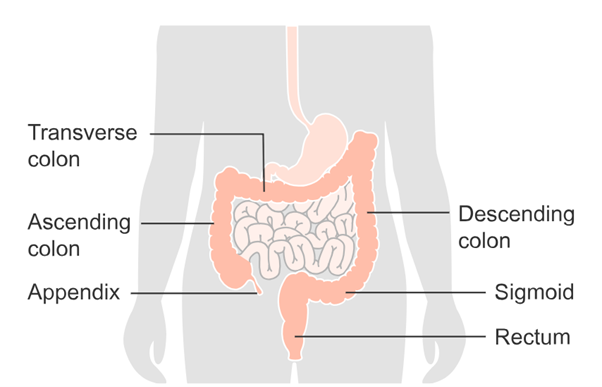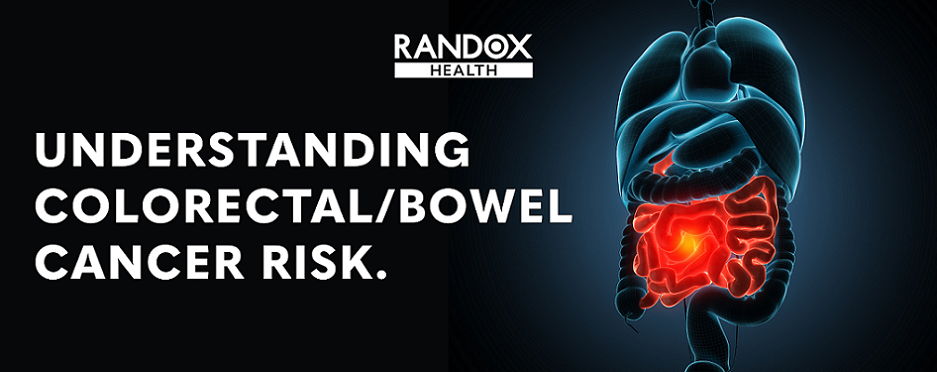04/04/2024
Cancer is a word that hits close to home for many of us and is one synonymous with anxiety and uncertainty. However, the worst thing we can do is fear the word. With April, being Colerectal / Bowel Cancer Awareness month, in this article we discuss some of the common symptoms of bowel cancer to look out for and the factors associated with higher risk.
The phrase early identification is crucial may seem a cliché, but many clichés are that for one reason, because they are true. Cancer can be diagnosed at stages 1, 2, 3 or 4 – Stages 1 and 2 are considered early, whereas stages 3 and 4 are late. Around 45% of cancer cases are diagnosed at the advanced stages 3 and 41. This is why it is essential that people be encouraged to remain vigilant and get tested for cancer if they are at risk.
What is Colorectal Cancer?
Colorectal cancer, otherwise known as Bowel cancer, is the 4th most common cancer in the UK, affecting around 43,000 people each year2. It affects the colon and the rectum, which make up the large bowel. In colorectal cancer, early detection is paramount – 85-90% of people diagnosed at stages 1 and 2 survive for at least 5 years or more after their diagnosis compared with 10% of those diagnosed with stage 4 colorectal cancer3.
The colon is divided into 4 sections: the ascending colon, the transverse colon, the descending colon, and sigmoid colon. The rectum is the final part of the large bowel and is where stool is stored until ready to be passed from the body.

The most common type of colorectal cancer is adenocarcinoma. These cancers begin in the mucus gland cells of the bowel. These cells produce mucus which makes it easier to pass stool. Other forms of colorectal cancer include: squamous cell tumours – tumours of the cells that make up the lining of the bowel; sarcomas – cancers of the bones and soft tissues including fat, muscle, blood vessels; lymphomas – cancers of the lymphatic system; melanoma – a type of skin cancer which can begin in the rectum; and carcinoid tumours – a slow growing tumour which affects hormone producing tissues, commonly in the digestive system4.
SYMPTOMS OF BOWEL CANCER / COLORECTAL CANCER
The symptoms of bowel cancer or colorectal cancer can range from relatively mild and subtle to more severe and a little scary. The most common symptoms of bowel cancer are blood in the stool, a change in bowel habit such as more frequent, looser stools and stomach pain5. Others include:
- Cramping pains in the abdomen
- Constipation
- A sensation of needing to strain or still needing to poo after going to the bathroom.
- Losing weight
- Tiredness and breathlessness
- Bloated sensation
- Vomiting
One of the problems with colorectal cancer is that these symptoms are nonspecific, that is, they may be caused by other conditions. For example, blood in the stool is often caused by haemorrhoids – swollen veins in the rectum. Blood in the stool cause by haemorrhoids is often fresher and a brighter shade of red compared to blood the darker red or black blood originating from the higher in the bowel. However, if you’re concerned about any shade of blood in the stool, or any of the symptoms above, please speak to your doctor.
BOWEL CANCER RISK
The risk of developing bowel cancer, like all cancers, is multifactorial. Things like age, genetics and lifestyle can have an impact on your risk of developing bowel cancer.
Around 5-10% of bowel cancers are thought to be caused by a mutation in a known gene. A common inherited form is known as Lynch syndrome which accounts for 2-4% of colorectal cancers6.
Some dietary factors have been linked with increased risk of bowel cancers. Eating lots of red and processed meats, such as sausages and chicken nuggets, and eating too little fibre, has been shown to increase the risk of developing bowel cancer7.
The UK government recommends people consume less than 70g of red and processed meat per day8 – that’s around 2 slices of cooked bacon. You can increase your fibre intake by making small changes such as swapping to wholegrain rice, pasta or bread or eating fruits and veg high in fibre, like raspberries and broccoli.
Some more factors which may increase your risk of developing bowel cancer include:
Bowel Cancer Testing.
As we mentioned, there are some genetic variants that, if you have them, may increase your risk of developing colorectal cancer. Having one of these variants or mutations doesn’t mean you will get cancer; it just means that you may be at a slightly higher risk than others who don’t have the variant.
Our Genetic Bowel Cancer Risk Test screens for 11 mutations known to be associated with an increased risk for colorectal cancer. It is estimated that 54% of colorectal cancer cases in the UK are preventable9 through lifestyle and dietary changes, like those we mentioned previously. If you would like to read more about genetic screening and genetic inheritance, take a look at our blogs Unzip your Genes and Genetic inheritance & Disorders.
If you’re concerned about your risk of colorectal cancer, or would simply like to put your mind at ease, you can book your genetic test with us today at https://randoxhealth.com/en-GB/in-clinic/bowel-cancer-risk. Included is a consultation with a genetic counsellor who will discuss the details of the test and the impact it may have on your and your family. We only need a simple blood sample, and you’ll get your results straight to your phone within 6 weeks.
- Cancer Research UK. Cancer Statistics for the UK. https://www.cancerresearchuk.org/health-professional/cancer-statistics-for-the-uk#heading-Four.
- Cancer Research UK. What is bowel cancer? https://www.cancerresearchuk.org/about-cancer/bowel-cancer/about-bowel-cancer.
- Cancer Research UK. Survival for bowel cancer. https://www.cancerresearchuk.org/about-cancer/bowel-cancer/survival.
- Cancer Research UK. Grades and types of bowel cancer. https://www.cancerresearchuk.org/about-cancer/bowel-cancer/stages-types-and-grades/types.
- NHS inform. Bowel cancer. https://www.nhsinform.scot/illnesses-and-conditions/cancer/cancer-types-in-adults/bowel-cancer/.
- Bhattacharya P, McHugh TW. Lynch Syndrome. StatPearls Publishing; 2024.
- Cancer Research UK. Risks and causes of bowel cancer. https://www.cancerresearchuk.org/about-cancer/bowel-cancer/risks-causes.
- NHS. Red meat and the risk of bowel cancer. https://www.nhs.uk/live-well/eat-well/food-guidelines-and-food-labels/red-meat-and-the-risk-of-bowel-cancer/.
- Cancer Research UK. Bowel cancer statistics. https://www.cancerresearchuk.org/health-professional/cancer-statistics/statistics-by-cancer-type/bowel-cancer#heading-Three.



